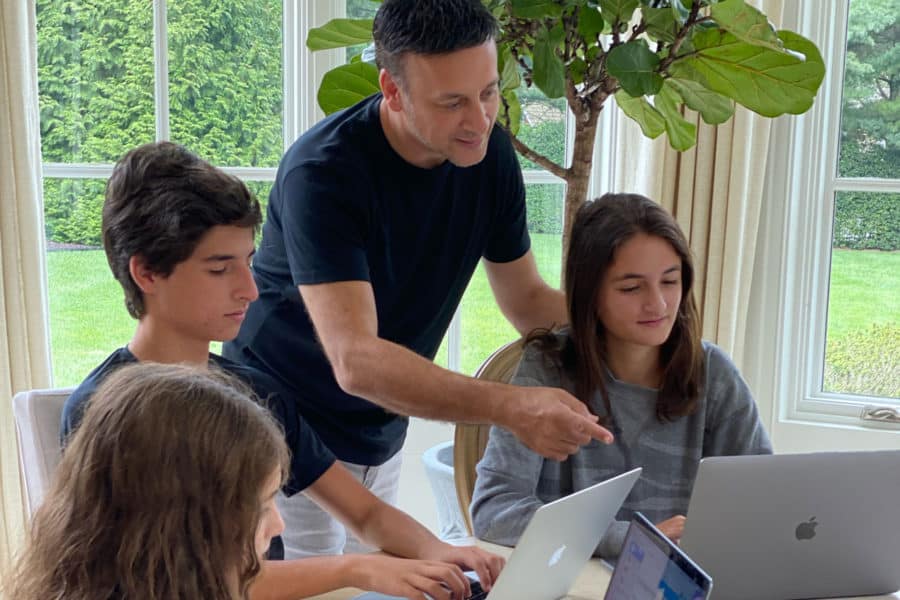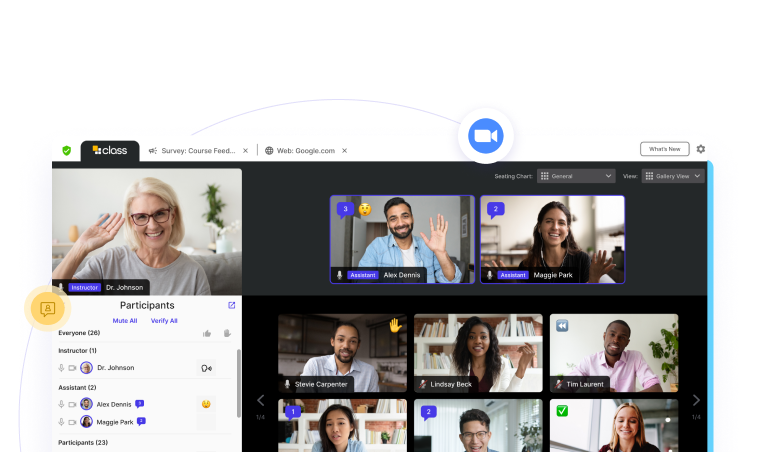
Michael Chasen is the co-founder and CEO of Class. He is an entrepreneur who has dedicated his career to improving the way people live and learn through technology. Chasen also served as co-founder and CEO of Blackboard Inc., a pioneering edtech company with software used by over 20,000 institutions and millions of instructors and learners worldwide.

Michael Chasen is the co-founder and CEO of Class. He is an entrepreneur who has dedicated his career to improving the way people live and learn through technology. Chasen also served as co-founder and CEO of Blackboard Inc., a pioneering edtech company with software used by over 20,000 institutions and millions of instructors and learners worldwide.

In March, more than 1.2 billion children around the world were told they could no longer physically go to school—that their classrooms, and their teachers, were moving online.
My three kids—Lily, Logan, and Skyler—were among them.
At the time, Lily was in second grade, Logan in eighth, and Skylar in tenth, and they were attending three different schools—a grade school, a middle school, and a high school. Suddenly they were learning from home. But they weren’t learning in the same way or—based on what we were observing–for the same amount of time.
While previously they had been spending about seven hours a day in the classroom, now they were online with their teachers for only about two to three hours a week. Their schooling had gone from a lot of interactions throughout the day with teachers and other students to just getting assignments during the week that they were expected to do on their own.
That concerned me. So we asked why—why were these teachers reducing their class time?
What we learned is that teachers had never been actually just lecturing for seven hours a day. A lot of classroom time was spent working on in-class assignments, working with other students in teams, or engaging in group discussions. Lecturing was just a piece of what the education process involved.
As teachers and students were relocated from classrooms to home settings, many of the fundamental aspects of the educational experience were lost. Even with kids coming back into the classroom this fall, the experience isn’t the same. Teachers can’t take attendance. They can’t hand out assignments. They can’t give a test or quiz. They can’t meet one-on-one with students.
Imagine students no longer being able to get into small groups to work on class projects. Imagine teachers no longer being able to look over a student’s shoulder to see if they’re understanding a new concept. Imagine losing the ability to see everyone in the classroom and to interact with them easily.
Suddenly an entire generation of learners are in a situation that has the potential for them to be left behind.
Zoom, currently, only allows teachers to do a fraction of what they are able to do in the classroom pre-pandemic. I wanted to make Zoom better for use in educational settings.
So I began to think about how these interactions could be different, and better. I had the right background to ponder this problem. I started Blackboard in a brownstone in Washington, D.C., with a fellow college classmate. We grew the company from the two of us to 3000 employees in 20 offices around the world. I got to take the company public and run it for seventeen years.
I have both a passion for education as well as expertise in online teaching and learning, so I took that experience and applied it to this situation. I saw an opportunity to enhance Zoom capabilities that were primarily developed for business meetings to make the virtual classroom feel like a real classroom for both students and teachers.
At the same time that I was thinking about ways to improve this situation, my cofounder Wes Boyer, who is our CTO, was also at work on the problem. Wes, like me, is passionate about education; he’s also a technology expert. He started to play around with ways of improving Zoom to make it easier for remote learning to happen and started ClassEdu Inc.; I joined him as a co-founder.
We’ve added all of that functionality, and more, with Class for Zoom. This situation won’t last forever. We won’t be forced to socially distance forever. But education will be changed forever. We want to change it for the better.
We’re here because of what happened with Covid, because students are struggling, and because we want to help. We’re making the virtual classroom feel like a real classroom and spreading happiness to teachers and students.
We’re in good company. We’re working with some of the same exceptional developers I worked with at Blackboard.
Our investors include some of the early investors and Board Members of Zoom, including Santi Subotovsky, a current Zoom board member from Emergence Capital, Jim Scheinman of Maven Partners, an early investor in Zoom and the person credited with naming Zoom; and Bill Tai, an investor with 30 years of VC experience and Zoom’s first committed backer.
We also have other leading education and technology investors including Deborah Quazzo, partner from GSV Ventures, one of the leading investment funds in education; Revolution’s Rise of the Rest Seed Fund led by Steve Case, co-founder of America Online (AOL), and chairman and CEO of Revolution; Jessie Woolley-Wilson, CEO DreamBox Learning, and previously President of Blackboard Inc.’s K-12 division; and Fred Schaufeld, co-founder and managing director of SWaN & Legend Venture Partners.
We’ve already raised $16 million in our first round of funding. And we’re getting very close to bringing this new product to market.
If you’re a K-12 or higher-ed teacher, or if you’re an education leader, we’ve opened up a Beta waitlist and invite you to sign up to be among the first to see how remote teaching can be changed dramatically—and how it can become significantly better. For students. For teachers. For parents. For you.

Michael Chasen is the co-founder and CEO of Class. He is an entrepreneur who has dedicated his career to improving the way people live and learn through technology. Chasen also served as co-founder and CEO of Blackboard Inc., a pioneering edtech company with software used by over 20,000 institutions and millions of instructors and learners worldwide.

Michael Chasen is the co-founder and CEO of Class. He is an entrepreneur who has dedicated his career to improving the way people live and learn through technology. Chasen also served as co-founder and CEO of Blackboard Inc., a pioneering edtech company with software used by over 20,000 institutions and millions of instructors and learners worldwide.
Sign up for a product demo today to learn how Class’s virtual classroom powers digital transformation at your organization.

Features
Products
Integrations